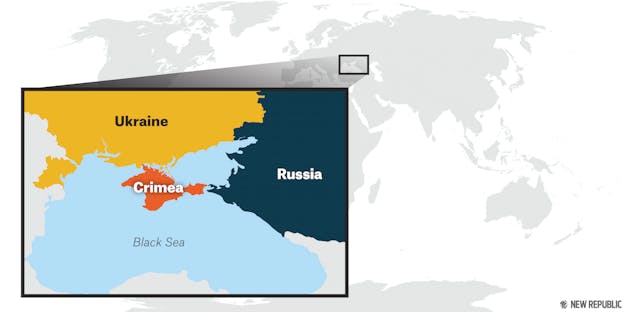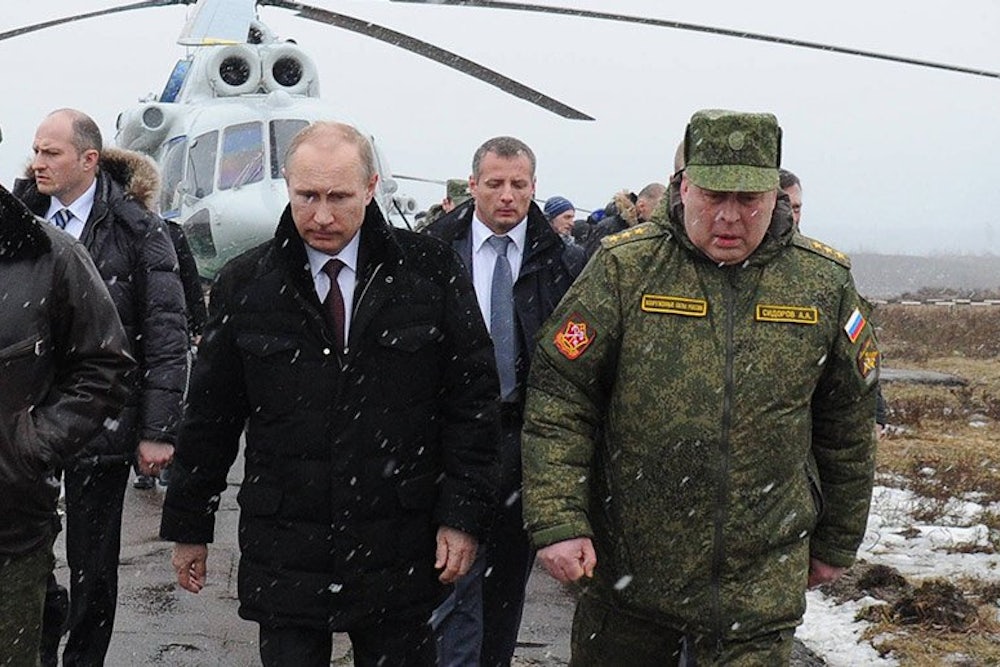“Now, just imagine that the Crimea is yours ... Believe me, you will acquire immortal fame such as no other sovereign of Russia ever had. This glory will open the way to still further and greater glory ...”—Memorandum from Grigory Potemkin to Catherine the Great, urging Crimean annexation, 1780.
The first time Russia annexed the Crimean peninsula, under the expansionist regime of Catherine the Great in 1783, Russia stood ascendant. Pushing west, south, and east simultaneously, covering steppe and coastline alike, imperial Russia swallowed territory at will. At the time, Crimea was but another jewel in the empress's crown. Claiming it fortified Black Sea security, chipped at the Ottoman Empire’s former territories, and guaranteed, as adviser-and-lover Grigory Potemkin told Catherine, “the security of the population of Novorossiya”—the Ukrainian territory whose deep Russian roots separatists claim legitimizes Russia's current incursion into eastern Ukraine.
In 1853, Catherine's treasure fell into chaos. French and British and Turkish troops swarmed the peninsula, seeking to check Russian expansion and to control the Black Sea. The Crimean War begat Leo Tolstoy and Florence Nightingale, balaclavas and war photography. But the war, in and of itself, was largely specious, a brew of confused imperialist motivations and bruised egos. Hundreds of thousands died, but little else changed. Russia held Crimea.
It was a century later that Moscow forfeited the peninsula. On February 27, 1954, a small notification on the front of the Soviet mouthpiece Pravda conceded what British and French troops had failed to take: Russia was giving up Crimea. One sentence, eight lines, beside a sprawling article about International Women’s Day—this was all Soviet leader Nikita Khrushchev required to hand Crimea to Ukraine. It was a gesture to celebrate Slavic fraternity between Moscow and Kiev, and besides, between fellow Soviet republics it formally amounted to bureaucratic relabeling.
Sixty years later, with the Soviet Union now dissolved, Russia reneged. The move came last spring, as Ukraine’s second successful revolution in a decade peaked, and protesters seeking to bring Ukraine closer to the European Union ousted an autocrat cozy with Moscow. Pro-Russian protests broke out along the peninsula, and crisply professional men with guns and unmarked uniforms began popping up in key locations. “Little green men,” some Crimeans called them. “Polite people,” the Russian defense minister joked. Whatever the title, they all made sure the Soviet-era gift was returned to Russia.
The annexation of Crimea snuffed Slavic fraternity. Europe saw its first forced-border change in decades. A year ago today, Russia announced that Ukraine’s ousted autocrat had officially asked for Moscow’s troops in Ukraine. Twelve months on, the Kremlin has by all accounts gotten away with the biggest territory heist the continent has seen since World War II.
Under the cover of Ukraine's revolutionary euphoria, Russian President Vladimir Putin stole this Maryland-sized peninsula, home to 2.4 million people. He had no legal justification. It was as naked a land-grab as anything Catherine the Great attempted, a move right out of 1939. And yet, a year after the peninsula helped spark the current carnage in Ukraine, Crimea barely warrants a mention, largely because Putin continues to escalate the mess in Ukraine into the greatest threat to European security since the Cold War.

Since Russia formalized the “annexation," consider the events that have pulled the world's attention away from Crimea: a Malaysian airliner obliterating in mid-flight, Russian-supplied missiles slaughtering civilians over eastern Ukraine, Russia’s economy quaking, sanctions compounding an oil collapse. Every time Putin threatens to use nuclear weapons, or cooks up conspiracies about Ukraine, or provokes NATO to deploy tanks to fend him off, he sucks air and energy away from any discussion of Crimea's fate. “I don't think there was any specific moment when the focus shifted," New York Univeristy professor and noted Russia-watcher Mark Galeotti told me. "It just inevitably followed the fighting."
Meanwhile, Brussels has taken to ignoring Crimea entirely, treating the peninsula like a contagion best forgotten. Washington has kept its distance, unwilling or unable to nudge Europe to hold talks about Crimea. Russia, opting for strident nationalism, considers the annexation settled. Krym nash, Moscow’s nationalists say. Crimea is ours.
For one idea of just how far Crimea has receded, look at the recent ceasefire negotiations: Crimea didn’t even come up during the discussions between Russia, Ukraine, and the European Union. The longer the occupation goes, the closer we move to a de facto recognition of the peninsula as part of Russia proper. Eleven nations officially recognized the annexation via a United Nations non-binding resolution that stirred toady dictators and aging autocrats to vote their consciences: Armenia, Belarus, Bolivia, Cuba, North Korea, Nicaragua, Russia, Sudan, Syria, Venezuela, and Zimbabwe. Three more have since offered governmental support for the annexation: Afghanistan, Kyrgyzstan, and Kazakhstan.
Recently French politicians speared a push to acknowledge the annexation outright. Marine Le Pen said the French government should recognize Crimea as Russian, while former President Nicolas Sarkozy was clearly posturing when he said recently that “Crimea chose Russia.” (Conveniently, both opinions will make it easier to get the stalled Mistral deal back on the table.) Sarkozy referred specifically to the referendum Putin slapped together last March in which Russia claimed 95 percent of Crimeans voted for reunification. Never mind that Russian troops held the “referendum” at gunpoint, or that the “international observers” hailed from Europe’s far-right parties, hardly known for their free and fair assessments. Never mind, too, that the peninsula’s original inhabitants, the Crimean Tatars, largely boycotted it.
Given a legitimate referendum, Crimeans may well have opted to join Russia. But we’ll never know. Any referendum moving forward risks legitimating Russia’s irredentism, a precedent that would only condone Putin.
Decades after Europe thought it had rid itself of imperialism, Moscow thieved Crimea—not that the developed world will recognize it anytime soon. In all likelihood, we’re looking at a situation similar to the Western policy of non-recognition regarding the Baltics during the Soviet period. Brussels, Washington, Tokyo, and Canberra will treat the occupation as just that: occupation. Unlike the independent Baltic states, though, Crimea is considered a disputed territory in the mold of a Kashmir or a West Bank. It is not a pleasant fate.
Even Russia’s leading opposition figures seem to have acquiesced to Putin's triumph. Opposition leader Alexei Navalny noted with resignation that the peninsula isn’t a “ham sandwich” that can be so easily handed back and forth. Opposition figure Mikhail Khodorkovsky, meanwhile, said that the “Crimea problem will go on for decades,” and that any path toward a solution “lies through the blurring of boundaries in Europe.” Neither supports returning Crimea to Ukraine outright. Boris Nemtsov seemed the lone major opposition figure to push back against Moscow’s occupation—until last weekend, when someone assassinated him just meters from the Kremlin.
All the while, Crimeans continue to suffer the slings of Russia under Putin. The new authorities have stripped billions in property and assets from former owners, swiping dry docks and film studios alike. The tourism industry, one of the peninsula’s lifebloods, has tanked as Europeans have stayed away. Financially, Crimea has fast become a millstone around Russia’s neck.
No group has been hit harder than the Crimean Tatars, from whom Catherine wrested the peninsula in the 18th century. The Tatars’ relations with Moscow have suffered ever since. In 1944, Soviet authorities uprooted every Tatar from their Crimean homeland and scattered them across Siberia and central Asia, an act of cultural genocide that swept up some 200,000 Tatars. Nearly half died during the deportation.
During the waning days of the Soviet Union, and especially during the first decade of Ukrainian independence, Tatars began returning. In the last census, in 2001, Tatars represented some 12 percent of Crimea's population—though given current demographic trajectories, there could well be more Tatars than Russians in Crimea within a dozen years. The traditional Tatar capital of Bakhchysarai blossomed once again. While their resettlement never enjoyed the full support of even the pro-European governments in Kiev, the Tatars remained a reliably pro-Western electoral bloc. And they didn’t show their preferences in political leanings alone. A few months before Euromaidan broke, I danced through the night with a group of older Tatars in a small restaurant in Simferopol, Crimea’s capital, rearranging tables for space, teaching them the proper moves for that grand Western staple, “Gangnam Style.”
Then the Russians came. Over the past twelve months, Moscow and local Russian authorities have banned public commemorations for the Tatar deportations, raided the Tatar parliament, and exiled the Tatars’ two top political figures: Mustafa Dzhemilev, who famously launched a 303-day hunger strike in 1975, the longest in Soviet history; and Refat Chubarov, who has described Putin as the “Hitler of today.” Multiple Tatar activists have turned up dead. Tatar media now stands on its last legs. As a November report from Human Rights Watch noted, “Human rights protections in Crimea have been severely curtailed since Russia began its occupation of the peninsula in February 2014. … In particular the authorities have targeted the Crimean Tatar community.”
As long as Crimea endures the Kremlin’s thumb, persecution of Tatars is all but certain to continue. Don't look for mass deportations. Instead, Russia will simply smother any hope the Tatars have that they might fully reclaim their culture and their home.
In his memo to Catherine urging the initial Russian annexation, Potemkin referred to Crimea as a “thorn.” More than two centuries later, this seems as apt a descriptor as any. Thanks to Moscow, Crimea’s now a thorn that’s easier for the West to ignore; the peninsula is a geopolitical question only Kiev wants to address. And that may be the enduring reality. British, French, and Turkish troops won’t be returning to dislodge Moscow from the peninsula. Putin, more a successor to Catherine than to Khrushchev, won’t be signing Crimea over to another capital—let alone to a state he maintains does not exist, as with Ukraine. Considering Russia’s limping economy and battered international standing, Crimea may be Putin's rare lasting prize.
It should cost him. Putin and his Anschluss shattered the Westphalian order, committing the cardinal sin of modern international law. Crimea is not likely to return to its rightful owners for years, for decades. That dismal fact does not permit us to forget. We overlook the peninsula to our—and to the Tatars’ and Europe’s—peril. Crimea once opened a grand glory to Catherine, but glory of the sort Potemkin promised is a fleeting thing. More lasting is the infamy Putin has earned by reenacting an 18th-century smash-and-grab. It will brand him till the end of his reign and long beyond.
